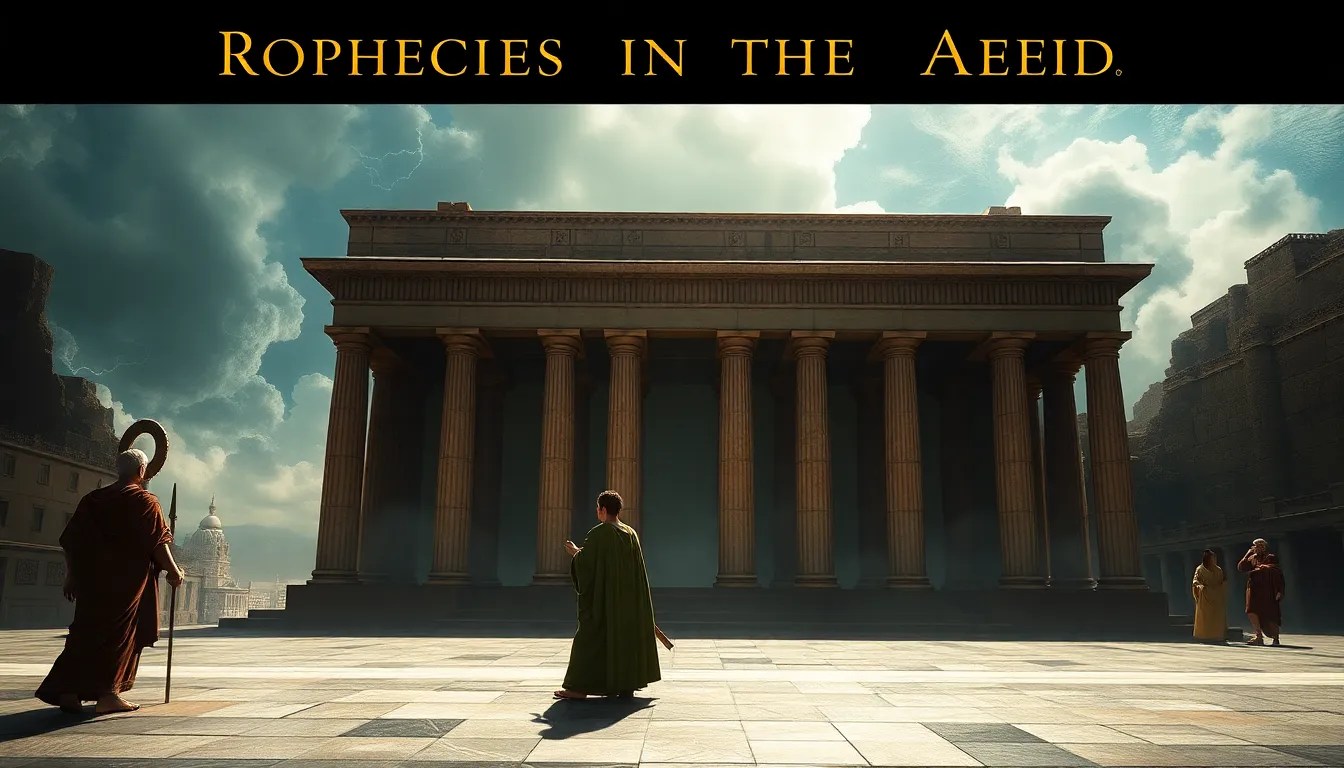Prophecies in the Aeneid: Virgil’s Vision of Rome’s Future
I. Introduction
The Aeneid, written by the renowned poet Virgil, stands as a cornerstone of Roman literature, reflecting the values, beliefs, and aspirations of ancient Rome. This epic poem narrates the journey of Aeneas, a Trojan hero, as he embarks on a quest to establish a new homeland in Italy, ultimately leading to the founding of Rome. Within this grand narrative, prophecies play a crucial role, guiding the characters and foreshadowing the future of the Roman people. This article aims to explore the prophetic elements embedded in the Aeneid, examining their implications for Rome and its identity.
II. Virgil’s Historical Context
Publius Vergilius Maro, known as Virgil, was born in 70 BCE near Mantua in northern Italy. His literary career flourished during a tumultuous period in Roman history marked by civil wars and the rise of Augustus. Virgil’s works, including the Eclogues and Georgics, established him as a leading poet of his time. The Aeneid, composed between 29 and 19 BCE, served not only as a narrative of heroism and adventure but also as a political tool to legitimize Augustus’ rule and the new order he sought to establish.
The political landscape of Rome during Virgil’s lifetime was characterized by significant upheaval. After Julius Caesar’s assassination in 44 BCE, a power struggle ensued, culminating in Augustus’ rise to power. The Aeneid can be seen as an attempt to provide a divine justification for Augustus’ reign, portraying him as a descendant of Aeneas and thus a figure of destiny. This historical context is essential for understanding the prophetic themes that permeate Virgil’s work.
III. The Concept of Prophecy in Roman Culture
In ancient Rome, prophecy held a significant place within the cultural and religious framework. Defined as a message purportedly communicated from the divine, prophecy played a crucial role in guiding decisions and shaping public policy. Roman citizens often sought the counsel of oracles and seers to interpret omens and predict future events, reflecting a deep-seated belief in fate and the influence of the gods.
- Comparison with Greek Prophetic Traditions: While both Roman and Greek cultures revered prophecy, the Romans integrated it more directly into their political and social life, using it to reinforce the legitimacy of their leaders.
- Shaping Roman Identity: Prophecies were instrumental in forging a collective identity among Romans, linking their past to future glory and emphasizing the notion of divine favor.
IV. Key Prophecies in the Aeneid
The Aeneid is replete with prophecies that not only guide Aeneas but also outline the destiny of Rome. Some of the most significant prophecies include:
- The Prophecy of Aeneas’ Journey: Aeneas is destined to journey from Troy to Italy, where he will establish a new city that will become the foundation of Rome. This journey is fraught with challenges, symbolizing the trials that Rome would face.
- The Future Greatness of the Roman People: The prophecies foretell the eventual greatness of Rome, its empire, and the peace it will bring, emphasizing themes of destiny and divine favor.
- The Role of the Sibyl: The Sibyl of Cumae serves as a pivotal prophetic figure, guiding Aeneas through the underworld and revealing crucial insights about his fate and the future of Rome.
V. Analysis of Prophetic Language and Imagery
Virgil employs rich symbolism and metaphorical language to convey the weight of prophecy throughout the Aeneid. The prophetic passages are filled with vivid imagery that evokes emotion and a sense of urgency. Key literary techniques include:
- Symbolism: The use of natural elements, such as storms and celestial events, often symbolizes the intervention of the divine in human affairs.
- Metaphor: Virgil frequently employs metaphors to draw parallels between Aeneas’ struggles and the larger destiny of Rome, intertwining personal and national narratives.
- Emotional Impact: The prophecies resonate deeply with the characters, influencing their decisions and actions, and heightening the dramatic tension within the epic.
VI. The Role of Fate and Free Will in the Aeneid
The tension between fate and free will is a central theme in the Aeneid. Virgil portrays a world where characters are often caught between their predetermined destinies and their individual choices. Key points include:
- Predestined Fate: Aeneas is depicted as a man of destiny, chosen by the gods to fulfill a great purpose. His journey is marked by prophetic revelations that underscore his unavoidable fate.
- Individual Choice: Despite the overarching theme of fate, characters are faced with moral dilemmas that require them to make choices, illustrating the complex interplay between destiny and agency.
- Roman Beliefs: This exploration of fate versus free will reflects Roman beliefs about destiny, emphasizing the importance of personal virtue and responsibility within the framework of divine will.
VII. The Legacy of Virgil’s Prophecies
The impact of Virgil’s prophecies extends beyond the Aeneid and into the fabric of Roman culture and literature. Key aspects of this legacy include:
- Influence on Literature: Virgil’s prophetic themes influenced countless writers and poets in Rome and beyond, shaping the epic tradition and the portrayal of destiny in literature.
- Historical Reception: The Aeneid has been interpreted in various historical contexts, often reflecting the political and cultural climates of the times.
- Enduring Resonance: Virgil’s vision of Rome continues to resonate today, serving as a powerful reminder of the interplay between prophecy, history, and national identity.
VIII. Conclusion
In summary, the prophecies in the Aeneid offer profound insights into the nature of destiny, identity, and the human experience. Virgil’s masterful integration of prophetic elements not only enriches the narrative but also reinforces the cultural and political ideals of Rome. As we reflect on Virgil’s messages, we are reminded of the enduring significance of prophecy in shaping national identity and the collective consciousness of a people. The Aeneid remains a testament to the power of literature to convey complex truths about fate, free will, and the legacy of a civilization.



